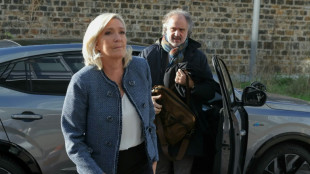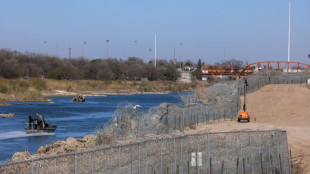
-
 Mbappe can be Real Madrid 'legend' like Ronaldo: Ancelotti
Mbappe can be Real Madrid 'legend' like Ronaldo: Ancelotti
-
Saka 'ready to go' for Arsenal after long injury lay-off: Arteta

-
 Aston Martin to sell stake in Formula One team
Aston Martin to sell stake in Formula One team
-
Three talking points ahead of clay-court season

-
 French court hands Le Pen five-year election ban
French court hands Le Pen five-year election ban
-
Probe accuses ex J-pop star Nakai of sexual assault

-
 Japan leads hefty global stock market losses on tariff woes
Japan leads hefty global stock market losses on tariff woes
-
Saka 'ready to go' after long injury lay-off: Arteta

-
 Ingebrigtsen Sr, on trial for abusing Olympic champion, says he was 'overly protective'
Ingebrigtsen Sr, on trial for abusing Olympic champion, says he was 'overly protective'
-
Tourists and locals enjoy 'ephemeral' Tokyo cherry blossoms

-
 Khamenei warns of 'strong' response if Iran attacked
Khamenei warns of 'strong' response if Iran attacked
-
France fines Apple 150 million euros over privacy feature

-
 UK PM urges nations to smash migrant smuggling gangs 'once and for all'
UK PM urges nations to smash migrant smuggling gangs 'once and for all'
-
Thai authorities probe collapse at quake-hit construction site

-
 France's Le Pen convicted in fake jobs trial
France's Le Pen convicted in fake jobs trial
-
Chinese tech giant Huawei says profits fell 28% last year

-
 Trump says confident of TikTok deal before deadline
Trump says confident of TikTok deal before deadline
-
Myanmar declares week of mourning as hopes fade for quake survivors

-
 Japan's Nikkei leads hefty market losses, gold hits record
Japan's Nikkei leads hefty market losses, gold hits record
-
Tears in Taiwan for relatives hit by Myanmar quake

-
 Venezuela says US revoked transnational oil, gas company licenses
Venezuela says US revoked transnational oil, gas company licenses
-
'Devastated': Relatives await news from Bangkok building collapse

-
 Arsenal, Tottenham to play pre-season North London derby in Hong Kong
Arsenal, Tottenham to play pre-season North London derby in Hong Kong
-
Japan's Nikkei leads hefty equity market losses; gold hits record

-
 Israel's Netanyahu picks new security chief, defying legal challenge
Israel's Netanyahu picks new security chief, defying legal challenge
-
Trump says US tariffs to hit 'all countries'

-
 Prayers and tears for Eid in quake-hit Mandalay
Prayers and tears for Eid in quake-hit Mandalay
-
After flops, movie industry targets fresh start at CinemaCon

-
 Tsunoda targets podium finish in Japan after 'unreal' Red Bull move
Tsunoda targets podium finish in Japan after 'unreal' Red Bull move
-
French chefs await new Michelin guide

-
 UK imposes travel permit on Europeans from Wednesday
UK imposes travel permit on Europeans from Wednesday
-
At his academy, Romanian legend Hagi shapes future champions

-
 Referee's lunch break saved Miami winner Mensik from early exit
Referee's lunch break saved Miami winner Mensik from early exit
-
Djokovic refuses to discuss eye ailment after shock Miami loss

-
 Mitchell magic as Cavs bag 60th win, Pistons and T'Wolves brawl
Mitchell magic as Cavs bag 60th win, Pistons and T'Wolves brawl
-
Mensik shocks Djokovic to win Miami Open

-
 Duterte lawyer: 'compelling' grounds to throw case out
Duterte lawyer: 'compelling' grounds to throw case out
-
What happens on Trump's 'Liberation Day' and beyond?

-
 Clock ticks on Trump's reciprocal tariffs as countries seek reprieve
Clock ticks on Trump's reciprocal tariffs as countries seek reprieve
-
Japan-Australia flagship hydrogen project stumbles

-
 Musk deploys wealth in bid to swing Wisconsin court vote
Musk deploys wealth in bid to swing Wisconsin court vote
-
Mensik upsets Djokovic to win Miami Open

-
 China manufacturing activity grows at highest rate in a year
China manufacturing activity grows at highest rate in a year
-
'Waited for death': Ex-detainees recount horrors of Sudan's RSF prisons

-
 Japan's Nikkei leads big losses in Asian markets as gold hits record
Japan's Nikkei leads big losses in Asian markets as gold hits record
-
Rescue hopes fading three days after deadly Myanmar quake

-
 'Basketbrawl' as seven ejected in Pistons-Wolves clash
'Basketbrawl' as seven ejected in Pistons-Wolves clash
-
Four men loom large in Microsoft history

-
 Computer pioneer Microsoft turns 50 in the age of AI
Computer pioneer Microsoft turns 50 in the age of AI
-
Trump calls out both Putin and Zelensky over ceasefire talks


Scientists use TikTok to explain, fight climate change
With his moustache caked in icicles and frozen droplets, glaciologist Peter Neff shows his 220,000 TikTok followers a sample of old ice excavated from Antarctica's Allan Hills.
The drop-shaped fragment encapsulates tiny air bubbles, remnants of 100,000-year-old atmosphere.
The greenhouse gases trapped inside carry precious information on Earth's past climate, explains @icy_pete as he brings the translucid nugget closer to the camera.
A growing number of scientists are leveraging the short-form video app TikTok to boost literacy on climate change, campaign for action or combat rampant disinformation online.
Some have gone viral on one of Gen Z's favourite platforms.
"TikTok allows me to give people a lens through which they can embody the experience of being a climate scientist in Antarctica," Neff told AFP.
"I share my insider perspective on how we produce important records of past climate without having to spend too much time on editing and playing all the games to make perfect content."
Neff is one of 17 tiktokers and instagrammers listed in the 2023 Climate Creators to Watch, a collaboration between startup media Pique Action and the Harvard School of Public Health.
- 'We have a responsibility' -
Some experts are also using the platform as a megaphone for climate action.
NASA climate scientist Peter Kalmus started posting videos on the platform after he was arrested in a civil disobedience action organised by the Scientist Rebellion group in Los Angeles in April 2022.
"When you engage in civil disobedience, you're taking a risk in order to try to have a positive benefit on society," Kalmus told AFP.
"So you want that civil disobedience action to be seen by as many people as possible."
Kalmus's most viral video to date shows him locked to the gates of the Wilson Air Center in Charlotte, North Carolina, delivering a speech to protest about carbon dioxide (CO2) emissions from private jets.
The researcher sees his @climatehuman channel as a way to motivate people, especially younger demographics, to become activists.
He also wants to ensure the spread of accurate information on the climate emergency.
Bringing climate literacy on TikTok is crucial to counterbalancing climate-related misinformation, according to Doug McNeall, a climate scientist at the UK Met Office and lecturer at the University of Exeter.
"Climate scientists need to show up," said McNeall, active on TikTok under the username @dougmcneall.
"We have a responsibility to make sure that the people promoting climate misinformation on purpose don't get a free header," he said, using a football metaphor.
An analysis by US-based public interest think tank Advance Democracy found the number of views of TikTok videos using seven hashtags associated with climate change denialism such as "#ClimateScam" and "#FakeClimateChange" increased by more than 50 percent over the course of 2022, to 14 million views.
In February this year, Doug McNeall and other experts such as Alaina Woods (@thegarbagequeen) posted videos flagging unfounded theories flourishing on the platform about so-called "15-minute cities".
- 'Normal people' -
The concept is simple -- an urban setting in which all amenities such as parks and grocery are accessible within a quarter of an hour's walk or bike ride from a person's home, reducing CO2 emissions from urban car commutes.
But searching for "15-minute city" on TikTok turns up mostly scornful videos claiming the schemes will restrict residents' movements and fine people for leaving their neighbourhoods.
To push back against misinformation on TikTok, scientists say they must first grab the users' attention.
"My strategy to interest young people on TikTok is similar to my approach to teaching," said Jessica Allen, a lecturer in renewable energy engineering at Australia's Newcastle University.
"I try to engage my audience with memes or other funny things rather than just delivering dry information," she told AFP.
On TikTok, Allen tries to popularise the chemistry behind renewable energy, which is essential to achieving carbon neutrality.
When she isn't sharing clips breaking down complex chemical reactions, @drjessallen may be posting TikTok dances in her lab.
"Scientists are normal people who can have fun," she said.
Indeed, deconstructing the image of scientists stuck in their ivory towers can help climate experts reach a larger audience.
"We often make the mistake of trying to make science seem perfect and not flawed like we all are," Neff said.
"On TikTok, we show the human foundation of our research."
M.Fischer--AMWN



